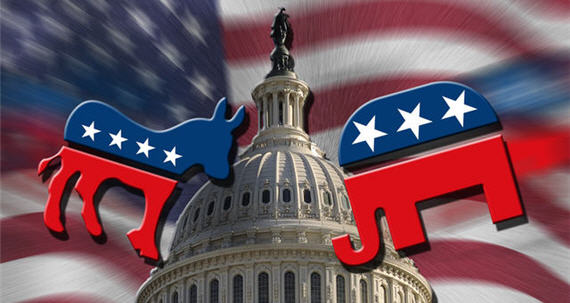Republicans Hold Edge In Battle For Senate Control
Thanks to favorable polling numbers and candidate selection, winning the Senate may very well be in the GOP's grasp.
For two election cycles now, the Republican Party has seen the hope of regaining control of the Senate slip through its grasp after appearing to be close. In 2010, despite a wave election that brought a net change of 63 seats in the House of Representatives, Republicans fell short of retaking the body after devastating losses in 2006 and 2008 in no small part thanks to bad candidates in states like Delaware, Nevada, and Colorado. Two years later, with the GOP only four seats short of gaining the majority, Republicans actually ended up losing ground thanks to an election loss in Indiana and the fact that moderate Republican Olympia Snowe retired and was replaced by Angus King, an Independent who ended up caucusing with the Democrats. This year, Republicans face another opportunity to grab control of the upper chamber and, as Chris Cillizza notes, for the moment at least things seem to be looking quite favorable for them:
The Senate playing field has shifted in Republicans’ favor over the last several weeks thanks to recruiting successes in Colorado and New Hampshire, as well as a national political environment that looks increasingly treacherous for Democrats.
That shifting has led to rising confidence among Republican strategists about the party’s chances of retaking the six seats the party needs to regain the Senate majority in 2014.
“After the last two Senate elections, this will be the year Charlie Brown finally gets to kick the football,” predicted prominent Republican pollster Glen Bolger. “Republicans have more opportunities than they have in the past, the terrible candidates are not catching the better general-election candidates napping like they did in cases like Christine O’Donnell and Richard Mourdock, and the [National Republican Senatorial Committee] is doing a good job ensuring candidates have a stronger digital presence than GOPers have had in the past. And yes, in this analogy, Harry Reid is Lucy, crabby as ever.”
Even Democrats have begun to acknowledge the problems in the fight for the Senate — albeit privately.
“There is no doubt that the Senate outlook has deteriorated significantly in the past six weeks,” admitted a prominent Democratic strategist. “Between the map and the [Affordable Care Act’s] unpopularity in the states on the map, it has gone from being a jump ball to advantage Republicans.”
Viewed broadly, there are now 11 Democratic-held seats in varying levels of peril — and 12 if you consider the Virginia seat held by Sen. Mark Warner. (Republicans argue Democratic-held seats in Oregon and Minnesota belong on that list as well.) That is a significant expansion of the playing field from even a few months ago — thanks largely to decisions by Rep. Cory Gardner (R-Colo.) and former U.S. senator Scott Brown (R-Mass.) to run in Colorado and New Hampshire, respectively. In each case, races that were not considered competitive immediately became so thanks to Republican recruits. (Something similar happened in Virginia, where former Republican National Committee Chairman Ed Gillespie’s candidacy gives Republicans a credible and serious candidate — although, unlike in New Hampshire and Colorado, there is almost no sign that Warner is in any trouble as of yet.)
That broader playing field matters for two big reasons. First, it gives Republicans a wider margin for error. They need a six-seat pickup and you’d much rather try to win six out of 12 than six out of six or seven. (Trying to run that sort of inside straight to the majority is where Republicans found themselves in 2012 — and they wound up lozzsing rather than gaining seats.) That means that even if Sen. Jeanne Shaheen (D) wins in New Hampshire — and most polling shows her with a comfortable edge over Brown — Republicans have lots of other pathways to the majority. Second, a broader playing field — particularly in expensive media markets like Boston’s, which covers the southern half of New Hampshire, Denver and, possibly, Washington, D.C. — means that Senate Democrats and their corresponding outside groups will have their dollars stretched as they attempt to retain the majority. Remember that the Democratic Senatorial Campaign Committee’s prime mission is to reelect its incumbents; so, if the committee has to spend money in New Hampshire, Virginia and Colorado, that means less money for, say, the open seat in Georgia or Alison Lundergan Grimes’s challenge to Sen. Mitch McConnell in Kentucky.
And, it’s not simply that there are more Republican opportunities on the board. It’s that a closer look at the 11/12 competitive seats suggests that where and how the races are playing out makes the GOP’s hand even stronger. In three states — Montana, South Dakota and West Virginia — independent handicappers like Charlie Cook and Stu Rothenberg rate Republicans as favorites to take over. If you accept that premise — and we do, although Montana has the potential to be more competitive than the other two — that means Republicans must win three out the following eight states to win back the majority: Arkansas, Alaska, Colorado, Iowa, Louisiana, Michigan, New Hampshire and North Carolina.
Of those eight states, Mitt Romney carried four of them — Arkansas, Alaska, Louisiana and North Carolina — in his unsuccessful bid for president in 2012. He won 45 percent in Michigan in 2012 and 46 percent in Colorado, Iowa and New Hampshire. In short, none of this octet of states are solidly Democratic. And, if Republicans were only to win the states that Romney carried in 2012 – a reasonable prospect given the national political environment (more on that below) — they will be in the majority come 2015.
The 2014 midterms were looking favorable for Republicans all along, of course, thanks both to the fact that the Senators up for re-election this year were last elected in the Democratic wave election of 2008 and to the fact that many of those Senators are representing states that Mitt Romney won in 2012. Additionally, retirements in states such as Montana, South Dakota, and West Virginia along with favorable candidate selection virtually guarantee that at least those three states will be turning red in 2014. If that happens, it means that Republicans only need to flip three more states from blue to red out of a list that includes states such as Louisiana, Arkansas, Alaska, and North Carolina, all of which Romney won in 2012.
As I’ve noted in the past, though, up until now there wasn’t very much margin for error for Republicans in 2014. If the field of play is limited to those seven Romney 2012 states, then Republicans would need to win at least six of those states in order to gain control of the Senate, and then it would only be by a razor-thin margin of 51 seats to 49 seats. Additionally, such a scenario requires absolutely no losses of seats currently held by Republicans. This is an important proviso given the fact that there is at least the potential, albeit one that I consider unlikely, that Mitch McConnell could lose the Kentucky Senate race to Alison Lundergan Grimes, or that Michelle Nunn could defeat whomever the GOP nominates in Georgia. Even if the GOP ultimately ends up holding on to both those seats, the party will likely be required to engage resources there that otherwise could have been used in one of those seven Romney states.
If Cook, Cillizza, and others who have argued in recent weeks that the field of competitive Senate races is expanding are correct, then Republicans will be in a far better position than they would have been otherwise. Even if they don’t win states like Michigan, Iowa, Colorado, or New Hampshire, the fact that Democratic Senators in those states are now vulnerable means that they will be forcing Democrats and their supporters to devote resources on races that might have otherwise been safe. Additionally, a victory in one or more of these states reduces the need to nearly sweep those seven Romney 2012 states or potentially offsets the unlikely loss in Kentucky or Georgia.
So, yes, as things stand now it does appear that Republicans have a slight edge in the battle for the Senate in 2014. If they pull it off, it’s likely only to lead to a slight 52-48 majority, but that will be sufficient to create a political earthquake, and to effectively make Barack Obama a lame duck for the remainder of his Presidency.







Bad news for America.
Having the Legislative branch run by stupid cannot be a positive development.
@C. Clavin:
They’re pretty much stupid across the board, both parties. The problem is that a significant portion of the GOP lately has been bat sh*t crazy on top of stupid.
Oooooh….a both sides do it comment.
I bet Doug is touching himself inappropriately right now.
If that happens, then we are screwed.
I have on my wall at work the quote from E.R. Murrow about a nation of sheep begetting a government of wolves. It got me to thinking: who is more the sheep; the people who demand that their government ensures the general welfare and well-being of its citizens, or the people that clamors for benefits of the corporate wealthy?
Someone please explain to me why it is not a government’s primary duty to ensure the welfare and well-being of all its citizens.
Interesting. So Republicans nominate crappy candidates, and therefore Harry Reid is Lucy. You’d think the original cartoon had Lucy holding the ball in the same place the whole time, with Charlie deciding the ball’s position was a librul lie, and kicking wildly to the right before falling on his butt.
It really doesn’t change anything, Obama would still have veto power. And the Dems will likely take the senate back in 2016(the map favors them just like it favors the GOP in 2014).
That is a damn good question.
Lets wait and see what happens. November is a ways off and the horse might learn to sing,
Democratic turnout in midterms has, historically, sucked. I wish I had a surefire way to change that, but I do not. I do think Kevin Drum is right in saying that unless the Dems aggressively counter the bullshit coming from the Right about the ACA, they risk a drubbing. The deck is already stacked against them because of where the contested seats are. They need not add to the problem. That’s how you get a replay of 2010.
As Scott Galupo points out, this not only doesn’t change anything because of Obama’s veto pen, but it oddly increases the chance of a Dem wave in 2016, since the R’s are going to want to propose some pretty unpopular things if they take both houses.
And speaking as a liberal, I’d much rather have a strong Dem wave in 2016 than 2014.
I’m hopeful, because everyone understands the danger-The Administration (which has finally given up the the hope of “reasonable bipartisan compromise”), the Democratic donors, the DNC, the Senators, even the MSM. No one in the media is saying things like “A Republican majority Senate won’t be so bad” and “Obama will still be able to get things done.” Broderism is finally dead. Just about everyone understands the kind of hell that will happen if the Republicans gain the Senate.
That means that all hands will be focused on keeping the Senate. That doesn’t mean that the map and the fundamentals are going to get any better,but if the Democrats know what’s coming, they’ll be better able to fight the battle.
The Democrats’ messaging is at least clear. They’re focused on inequality and raising the minimum wage. They’ve drawn a clear line between themselves and the Republicans on the economic and most social issues, and that’s a good thing. They’re still pulling their punches, IMO, but I expect the messaging will get sharper.I expect a big focus on GOTV. The much maligned Macauliffe showed that it could be done in Virginia in an off year election, and I expect that Democrats will be copying his template.
As to the ACA, I think things will get better. There are two wings to the ACA .There are the insurance exchanges, which have been much written about and which have been troubled. The cool kids at Wonkblog have been focused on the exchanges and 90 per cent of the writing have been about them.The exchanges have been coming together after a disastrous start, but I’m thinking it’s never going to be popular because it’s so complex .
The second wing of Obamacare has been Medicaid expansion,and it’s been a smashing success. Who knew that the single payer half of the ACA would be simple, straightforward, and easy to administer and understand? (Every liberal, that’s who). Over 7M people have signed up for expanded Medicaid, and it’s a success everywhere it’s tried. It’s so popular that the Democrats have a wedge issue where the Republicans have blocked expanded Medicaid. Those Republicans who have blocked it have no good answer for why they are passing up not insuring millions of their citizens, and Senators like Landrieu are making hay ou of that.
In the red states that allowed exopanded Medicaid, not only are millions signing up-what’s important is the kind of people signing up-, working class southern and Appalachian whites. Now those folks still hate the black man in the White House and the program named for it, but they like regular access to health care for themselves and their children, and they’re not so dumb that they are going to give that up. Senator Pryor thas been pushing for Arkansas to get expanded Medicaid, and Arkansas has recently accepted it. I expect that this will help him in November
It matters if only for one reason: if a Supreme court Justice retires, or is forced for reasons of health to resign, then anyone Obama nominates to the Court will face an even more uphill climb.
In fact, Justice Ginsburg would do well to consider retiring now while Obama has a Democratic Senate to deal with.
Well, it’s not just that — it’s the fact that at present the Senate is always tilted to Republicans, thanks to the large number of relatively unpopulated rural states. Remember that the approximately 600,000 Alaskans get as many Senators as the 38 million Californians….
Wow, Cook, Rothenburg AND Cilizza all say that this will be a big election for Republicans?
That hasn’t happened since… well, since every election cycle in history!
Stonetools: Now those folks still hate the black man in the White House and the program named for it, but they like regular access to health care for themselves and their children, and they’re not so dumb that they are going to give that up.
Yeah…I admire your optimism here but I know too many people in that position who think the Republicans are just going to take things away from “those people” and not them. The idea that they are in the same boat as “those people” just doesn’t compute for them.
To follow up on Rafer Janders comment – New York and CA have ~ 60 million people and 4 senators and Montana, N & S Dakota and Wyoming have ~ 3 million people and 8 senators.
Real nice system we got here.
@Rafer Janders: Interestingly enough, the small-state senate seats actually split pretty evenly at the moment. You have Wyoming on one hand, but then Vermont on the other. And some of the small red states (Montana, Dakotas, Alaska) have shown a willingness to elect Democrats. A big part of the Republican advantage in the Senate and EC actually resides in their dominance in medium-sized southern states while Democrats rule or split the most population-heavy states (except Texas).
(Not making a broad point here. I just found it really interesting that Democrats have more seats in states with under a million people (and under 1.5 million) than Republicans do.)
While possible for the Republicans to take the Senate, I think it remains unlikely. Right now Larry Sabato’s Crystal Ball is calling 48 Senate seats to be held by Democrats, 49 by Republicans and three are too close to call. I still think the most likely outcome is 50-50 which means that the Democrats hold the Senate.
The amusing part of all of this is it potentially puts Angus King in the position of being the most powerful man in the Senate.
@MikeSJ: That was the entire point of the Senate, to counter the electoral influence of larger states in the House. Filibustering and such came later.
@Dave Schuler:
“The amusing part of all of this is it potentially puts Angus King in the position of being the most powerful man in the Senate.”
I think Joe Manchin would be more powerful than King in a 50-50 Senate.
@Dave Schuler: Agree. I do expect the GOP to find a way to snatch defeat from the jaws of victory, as they did in ’10 & ’12 Senate contests. But they very well may get to 49 or 50. That at least opens the possibility of taking control of the Senate by getting King to Caucus GOP, getting Manchin to switch parties, or both.
@Jr:
This is assuming that the Republicans will use their new majority in Congress to attempt to pass legislation. The “lame duck” stuff is an acknowledgement that they will not do that. If a Republican is interested in governing, they run for governor. If they want to be a fly in the ointment, they run for congress.
@trumwill: In a follow-up to this comment, if we divide the amount of a state that the senate seat represents by two, the 45 Republican seats represent 42% of the nation’s population, while the 55 Democratic seats represent 58%. That’s a smaller difference than I would have actually guessed.
Also, I ran the numbers to evaluate my previous comment about the Republican advantage being in middle-sizes states. That turns out to be mostly correct. They do very well among states 1.5-3m people and are also overrepresented among states with 3-7m people. Democrats overperform in the biggest states as well as the smallest.
@dennis:
The original, ideal form of government (going back to prehistory to tribal elders and such) was to be an impartial body settling disputes between two tribesmen, or citizens. The law is a codification of how the government settles on particular oft-repeated disputes. It wasn’t the arbitrator who guaranteed the welfare of its citizens, it was the tribe itself. That’s just what you did as a member of the tribe.
We have the most multitudinous “tribe” in the world, to the point that some members of our tribe don’t consider others part of it. They externalize government from themselves because that government treats all members [roughly] equally. What’s called racism here would be called nationalism somewhere else. Probably.
@Tillman:
No. The point of the Senate(The Upper House) was to be a house controlled by elites to counter the influence of the House of Representative, that was supposed to represent the people. The model for the US Senate was Britain´s House of Lords.
The equal representation only exists because the small states demanded it during the Constitutional Convention..
@anjin-san:
Government’s only duty is to protect the lives, liberties, and property of the citizenry. Nothing more or less.
@Ivan Pike Trolle:
The US Constitution disagrees with you.
@stonetools:
Actually, Article 1 Section 8 explicitly states what the Federal Government is allowed to do. That is how they promote the general welfare. So I would say it does agree with me.
@Ivan Pike Trolle:
I think you have mistaken “Congress” for the “Federal Government.”
And seriously? “Government’s only duty is to protect the lives, liberties, and property of the citizenry.” Sure….that’s why we have the drug war. That’s why we invaded Iraq. That’s why Bloomberg was trying to take your sodas and why Walker was trying to bust unions. That’s why we got the stimulus and the ACA.
This statement is so broad to be nearly meaningless.
Of course, if you’re making an argument for a Nozickian night-watchman state, good luck. Especially if you’re going to refer to the wording of the Constitution, which has a different opinion.
@stonetools: It depends what the words “promote the general welfare” mean. It’s worth noting that the Articles of Confederation used similar language (“and their mutual and general welfare”) and clearly didn’t imply anything like ensuring the welfare and well-being of all its citizens. Article 3 is as follows:
With that in mind, the Preamble to the Constitution sought to do nothing more than make a more perfect union than the current league of friendship, to establish justice at a time when states weren’t paying off their debt, and to ensure domestic tranquility at a time when states weren’t cooperating.
@Ivan Pike Trolle
The Declaration of Independence also mentions “Life, Liberty and the pursuit of Happiness.–That to secure these rights, Governments are instituted among Men” and “Safety and Happiness”.
While the Declaration does not carry the force of law, clearly these concepts were of great importance to the founding fathers. It’s kind of hard to be “safe and happy” if you are sick and have no health insurance.
For that matter, where does the constitution say we could go to the moon?
@Andre Kenji:
Explain the incongruity to me. I’m not seeing it.
The Senate being a special chamber for elites to stew in for six years doesn’t match how Representatives would also be considered elites, especially back in the early years. Henry Clay was better known as a House Speaker than his later terms as Senator.
@downvotes: That’s what I get for playing devil’s advocate.
@stonetools: The Preamble to the Constitution has about as much force of law behind it as the Declaration of Independence. A set of ideals to aspire to does not equal legally-binding requirements on our government.
Nate Silver calls it a toss up…
And christ, can we stop calling Scott Brown a viable candidate? He’s a carpet bagger fresh off an electoral loss as an incumbent. He’s about as viable as Alan Keyes was against Obama.
@Tillman:
FWIW, I liked that post of yours. Who is in the ingroup and who is the Other matters a lot.